Request a Catalog
Marine Corps Ball Speech
Sgt Grit,
I read every edition of your newletter, and from your articles I am reminded of the pride I feel for my two tours as an FMF Corpsman, and one tour on a Marine Corps District Staff.
On November 10th, the Marine Corps League, Detachment 708, Spring Hill, FL held a Marine Corps Ball. This year they chose to honor the FMF Corpsmen.
I am one of five in our Detatchment, and was asked to be the Keynote Speaker. I spend months preparing my speech, and puting together display boards of memoriabelia from all of us “Docs”.
The topic of my speech was, “The BondSpoken and Unspoken”. I spoke of the special bond between “Docs” and their Marines. Although I practiced my speech continiously. I knew I would have problems delivering it without my emotions getting the best of me. Needless to say, I wept as I delivered portions of my speech. Needless to say, the audience wept too. When I concluded, a Marine from my detachment who had lost his Marine Grandson in Iraq, came to me and thanked me. It was a comfort to him and his family that FMF Corpsman were in the field to aid the men we could save and comfort the men we could not save. I’ve attached a copy of my speech and thought you and your readership might like to read about the bond we “Docs” have with “Our” Marines.
Semper Fi,
HMC Philip L. Stern USN
1966-1986
RVN 67-68
Marine Corps Ball Speech
Philip L. Stern
It’s quiet. There is hardly a breeze. The sun shines down through the leaves leaving a patchwork of shadows on the ground. It looks like a perfect day for a picnic, if you were back home.
Suddenly, mortar rounds shake the land and the stillness is shattered. The roar of machine gun fire mixes with the staccato burst from assault rifles. Within seconds, the moans of the wounded are added to the din.
“Corpsman up!” someone yells, and a young Navy Hospital Corpsman crawls on his belly toward the cry.
If anyone had told this man when he joined the Navy that he would be working with the Fleet Marine Force as a line company corpsman, he probably would have laughed. “I’m not joining the Marine Corps, I’m joining the Navy”, he would have argued.
But now, his Navy uniform has been traded in for Marine cammies.
Under a hail of bullets he must reach the wounded any way he can, usually on his belly. The priorities are simple, apply first aid? without getting killed. He bandages wounds, then summons help moving the injured from the battle field.
He knows going in that you can’t save them all. In a war, you are going to have people die on you, no matter what you do. That’s part of war. But you’re going to have more people die on you if you don’t do anything.
A Corpsman has to move under fire, while everyone else is down. The first time is no problem, but it’s a gut check every time after that.
Unfortunately, you can’t get you head and your butt inside your helmet at the same time.
I know I’ve tried.
There are very few combat Corpsmen who have not been scratched or nicked, physically or mentally.
All Hospital Corpsman are volunteers. They want to be Hospital Corpsmen. So they have some feel for the treatment of their fellow man, and the caring of the sick and injured. That element of caring is already there before he comes to the FMF.
Once in combat, a Corpsman earns the title “Doc”. A Marine will do anything he can for them. It’s a special relationshipone bonded in blood and mutual respect.
Yes, there is the spoken bond that all warriors have. You know the usual bravado amongst people in combat, those “on the line”. But there is also the unspoken bond between Corpsmen and Marines.
In the lobby of the National Naval Medical Center in Bethesda Maryland stand the Corpsmen War Memorial. There are pictures of it on the display board. The statue is titled “Unspoken Bond”.
The inscription at the base reads, “This memorial is dedicated to the Naval Hospital Corpsmen who served with the Marines in the Pacific during World War II. “Doc” was the special comrade who pulled them to safety, patched their wounds and shared their foxholes.
Established in war and ennobled in peace. This bond will always endure.”
This statue was a gift to the Navy by a corpsman that just happened to have saved the life of one William “Wild Bill” Taylor. Wild Bill will be happy to tell you about it Latter this evening.
Doc Laing later went on to become a physician, and he has written three books on Hospital Corpsmen in WWII. Unspoken Bond, Battle Dressings and Mercy, and Cry Corpsman.
Will Laing cites in the last book, the total number of Naval medical personnel killed in action or wounded during all the Pacific campaigns was an appalling number. 82 Navy doctors, 17 dental officers, 2 hospital corps officers, and 1,046 Hospital Corpsmen were officially listed as “killed in action”. That’s just the Pacific campaigns during WWII, and I think they are missing nurses in their list.
The unspoken bond. (PAUSE)
We Corpsmen and Marines know about the unspoken bond. The Marine knows that if he is injured, Doc will come to his aid. Doc will do what he can to make the pain go away. Doc will stop the bleeding. Doc will protect him. Doc will assure him, and Doc will get him to safety.
Doc knows that the Marines will do whatever they can to protect him. And they will be there to help care for him if he should be injured. But, it goes way beyond that.
The unspoken bond is also when a badly hurt Marine knows he is dying and the Doc knows it too. But, Doc makes him comfortable and stays with him.
Men dying in battle often call for their mother or for their God. Sometimes Doc has to be the next best thing.
Doc holds his hand. The Marine doesn’t say a word, but he squeezes your hand, and his look tells you what he is thinking, “Thanks Doc for not letting me die alone”. Sometimes Docs and Chaplains have to trade jobs.
In Vietnam, a month or so before I joined 2nd Platoon, Mike Company, Third Battalion, Fifth Marines, a Chaplain by the name of Vincent Capodanno was killed in action while in the field with what would later be my Platoon. He was later awarded the Medal of Honor and had a Destroyer named for him.
Chaplain Capodanno was administering last rites and helping the corpsmen treat the wounded. He was killed coming to the aid a wounded Corpsman.
Sometimes Chaplains and Docs trade jobs too.
(Pause)
We Docs and Marines are one. Corpsmen take their place alongside Marines. We do our share.
We’ve humped ammo; we’ve stood radio watch at night so the Radioman can get some sleep; we’ve taken our turn walking foxhole perimeters at night so others could get some rest too; we’ve carried spare rifles so we could provide one if someone’s rifle jamed; we’ve filled sandbags with the guys from our platoon when they needed filling. We help here in the galley and serve the detachment in many areas.
In 1945, Pharmacist Mate 2nd Class John Bradley helped some of his Marine buddies put a pipe in the ground and raise the flag over Iwo Jima. John told others for many years that he was just lending a hand to his buddies.
He did not know how famous Joe Rosenthal’s photo would make him, or that his face would be on the Marine Corps Memorial. How fitting. A Corpsman was just helping his buddies.
To those of us who followed, John showed us that we Hospital Corpsmen need to be one with the Marines we serve. They are our buddies. We, eat, sleep, fight and die with them. We have a bondspoken and unspoken. (Pause)
Tonight we have with us a variety of Docs. We have amongst us a Dental Technician. Whom we affectionately call “Gummers Mates”. Dental Techs have long worked alongside Hospital Corpsman, and vice versa. On my first day in Vietnam, I witnessed a mass causality situation at my Battalion Aid Station. I was a little overwhelmed being my first day in country. My wise old Chief told me to go help the Dentist and Dental Techs. I was a little baffled by this.
When I arrived at the Dental Tent, there was a Dentist and Dental Tech removing pieces of shrapnel from the walking wounded.
So my first combat medical experience was at the elbow of a Dental Tech. Earlier this year the Navy did away with the Dental Technician Rating.
Technically, they were always a part of the Hospital Corps, but now we’re all Hospital Corpsmen. We all attend Hospital Corps School and like Corpsmen who become Lab Techs or X-Ray Techs, some will become Dental Techs. We are now all Docs, and I welcome you.
We also have a Pharmacist Mate with us. Corpsmen have been known by many names since the Revolutionary War. Since the Hospital Corps was founded in 1898, the official name has always been Hospital Corpsman. But the Navy Rating’s name has had a number of variations, and Just prior to 1948, Corpsmen were called Pharmacist Mates.
We also have a Navy Chaplain who served with the FMF and worked with Corpsmen in the field. He’s an Honorary Doc.
In any case we’re all the ones called Doc.
You know, FMF Corpsmen serves two Corps: The Hospital Corps, and Marine Corps. Corpsmen take their oath from the Hospital Corps. “I hold the care of the sick and injured to be a privilege and sacred trust. I dedicate my heart, mind, and strength to the work before me.”
What he takes from the Marine Corps is simple, Semper FidelisAlways faithful.
Who Am I
I was that which others did not want to be.
I went where others feared to go, and I did what others failed to do.
I asked nothing from those that gave nothing, and reluctantly accepted the fact of eternal loneliness should I fail.
I have seen the face of terror, felt the stinging cold of fear and enjoyed the sweet taste of a moments love.
I have cried, pained, and hoped… but most of all I have lived times others were to say are “Best Forgotten”.
Today I am able to say I was proud of what I was….
A United States Navy Fleet Marine Force Combat Corpsman.
I am a suave and debonair global soldier of the seas. I am a bald headed, beady eyed, amphibious monster.
I am a professional warrior with a clean body and a dirty mind. I don’t rust, bust or collect dust.
My tales are told around a million camp fires on a thousand battle fields and as many fighting ships. Heaven doesn’t want me, and Hell won’t have me.
‘I’m the one called ‘doc’
I shall not walk in your footsteps,
But I will walk by your side.
I shall not walk in your image,
I’ve earned my own title of pride.
We’ve answered the call together,
On sea and foreign land.
When the cry for help was given,
I’ve been there right at hand.
Whether I am on the ocean,
Or in the jungle wearing greens,
Giving aid to my fellow man,
Be it sailors or Marine’s.
So the next time you see a corpsman
And you think of calling him ‘Squid’,
Think of the job he is doing
As those before him did.
And if you ever have to go out there, and your life is on the block,
Look at the one right next to you…I’m the one that they call “Doc”.
(Pause)
I would like to thank our brother Doc, Chaplain LeFavor, for being with us tonight, and I would like you to meet the Docs of Detachment 708.
As I call your name, would you stand and remain standing.
Hospitalmen Joseph Schlosser
Hospital Corpsman 3rd Class William Vanya
Dental Technician 2nd Class Arthur Schultz
Pharmacist Mate 1st Class Michael Baier
And your’s truly, Chief Hospital Corpsman Philip Stern
(Pause)
I ask all assembled here to stand and join me in a toast.
(PAUSE)
If you’ll allow me, I’ve modified the last verse of the Marine Corps Hymn a bit for this occasion.
“Here’s health to you and to the Corp”s” which we were proud to serve. In many a strife some Corpsmen lost their life, but they never lost their nerve. If all the other services ever look on heaven’s scenes, (Pause)
(Slow)they will find an FMF Corpsman, alongside his United States Marines.
Semper Fi!


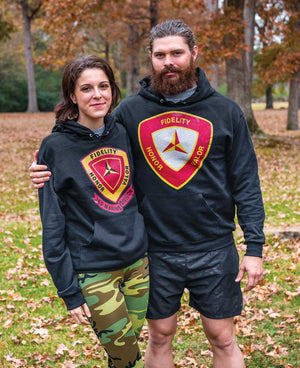
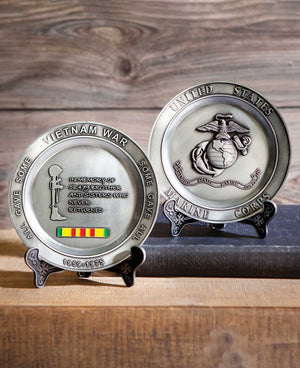
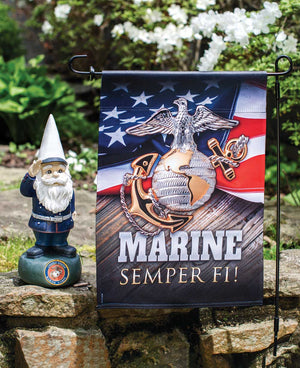
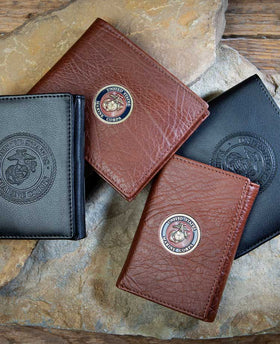
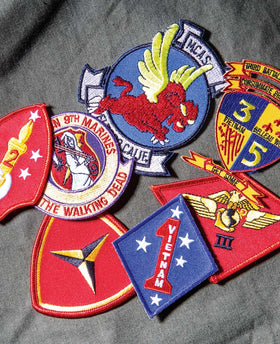
Leave a comment